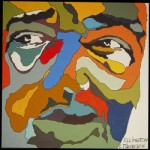 Composer, orchestra conductor, and jazz musician, born in Washington, District of Columbia, USA. Raised in a moderately well-to-do family (his father was a White House butler and later a blueprint-maker for the US Navy), he studied piano and painting from age six, and acquired his nickname from a boyhood friend. Composer, orchestra conductor, and jazz musician, born in Washington, District of Columbia, USA. Raised in a moderately well-to-do family (his father was a White House butler and later a blueprint-maker for the US Navy), he studied piano and painting from age six, and acquired his nickname from a boyhood friend.
Duke Ellington began standing in for ragtime pianist Lester Dishman at a Washington cafe in 1914, and while there,Duke Ellington wrote his first composition, "Soda Fountain Rag".
Duke won a poster design contest sponsored by the National Association for the Advancement of Colored People (1917), and this prompted him to leave high school before graduation to operate his own sign-painting business, but a year later he declined a scholarship from the Pratt Institute (Brooklyn) and devoted himself exclusively to music.
Duke Ellington first established his name in Washington by supplying bands for parties and dances, and as a sideman in other bands.
In 1923 he and hometown associates Sonny Greer and Otto Hardwick moved to New York City and began working as "the Washingtonians".
He assumed leadership of the ensemble, which in 1924 made its first recordings and began a three-year residency at a Broadway speakeasy. He wrote the score for the "Chocolate Kiddies "(1925), a revue that ran for two years in Germany.
Duke also began to attract significant sidemen to his band, including such colourful, blues-oriented players as Johnny Hodges and Cootie Williams, who helped form Duke Ellington's signature style and propel his output as a composer.
"The Duke Ellington Orchestra "made its decisive opening at the Cotton Club (Dec 1927), the showplace of Harlem speakeasies, remaining in residency until 1932.
By this time, through radio broadcasts and many recordings for US, English, and French labels, Duke Ellington was internationally renowned as the foremost jazz composer and bandleader.
In 1930 he performed with his orchestra in the Amos and Andy film Check and Double Check, the first of many such film appearances.
In 1933 he led his 14-piece band on its first tour of England and Europe, and for the next 40 years he maintained a near-constant touring schedule, broken only by perennial residencies at clubs in New York, Chicago, Los Angeles, London, and Paris.
During 1930–42 he was at his most creative, composing a series of pieces that highlighted the distinct musical personalities of his loyal sidemen.
In 1938 he hired composer-arranger Billy Strayhorn, an essential collaborator whose 1941 composition "Take the "A" Train " became the band's theme. During this period Duke Ellington also produced several of his most enduring works, including "Mood Indigo", "Sophisticated Lady", "In a Sentimental Mood", and "Don't Get Around Much Anymore".
In 1943 he introduced his celebrated extended work, Black, Brown, and Beige at Carnegie Hall, where he premiered other ambitious works at annual concerts during 1948.
Throughout the early 1950s he was virtually alone among jazz orchestra leaders in keeping his band intact, though he suffered several key personnel changes and a reduction in the quality of his bookings.
In 1955 Johnny Hodges rejoined the band after a four-year absence and during the next five years Duke Ellington's popularity underwent a dramatic renewal, encouraged by a successful appearance at the Newport Jazz Festival in 1956, the recording of which became his biggest-selling album.
In 1959 his soundtrack for "Anatomy of a Murder " was the first commissioned from an African-American composer for a major Hollywood film.
His overseas tours in the 1960s and 1970s inspired several large-scale suites, and in his final decade he also wrote liturgical music for concerts he presented in cathedrals in the USA, England, and Germany.
Increasingly recognized as a major American composer, he received numerous honourary degrees and awards after 1963, including the Presidential Medal of Freedom (1969).
In 1971 he became the first jazz musician inducted into the Royal Academy of Music in Stockholm, Sweden. His autobiography, "Music Is My Mistress", was published in 1973.
He led his band until a couple of months before his death from cancer, when it was taken over by his son, Mercer Ellington (1919–96).
|